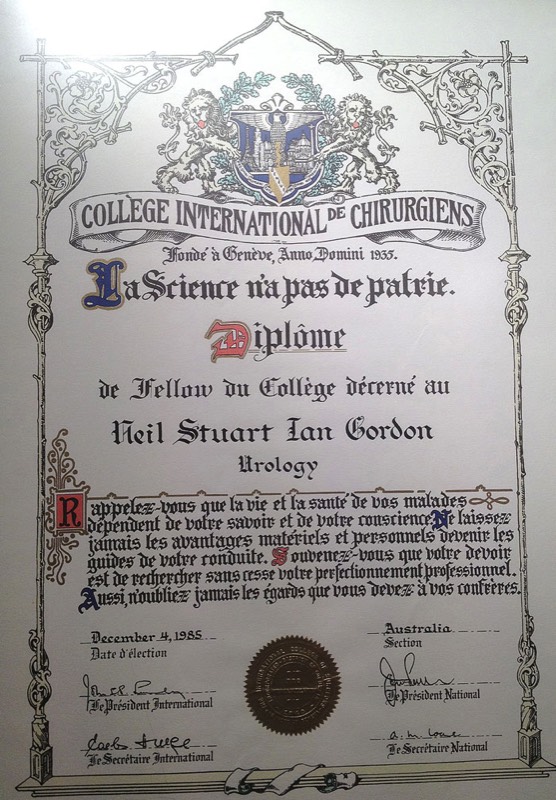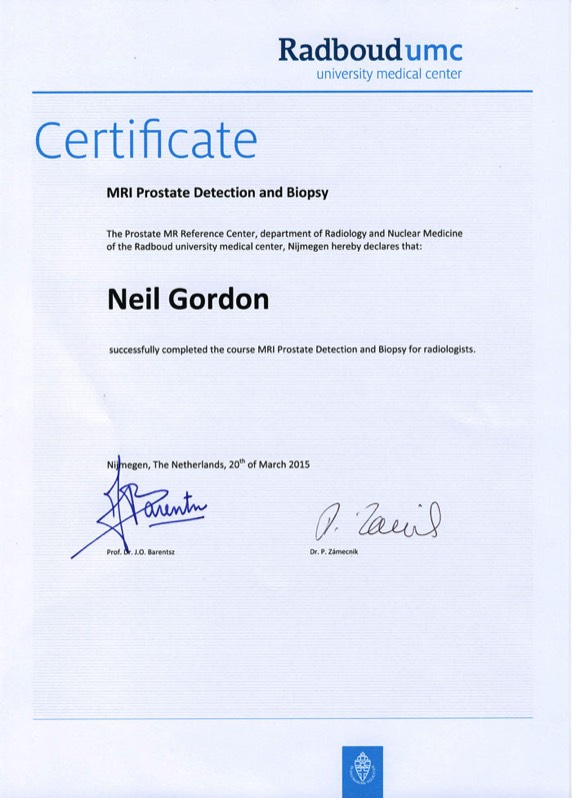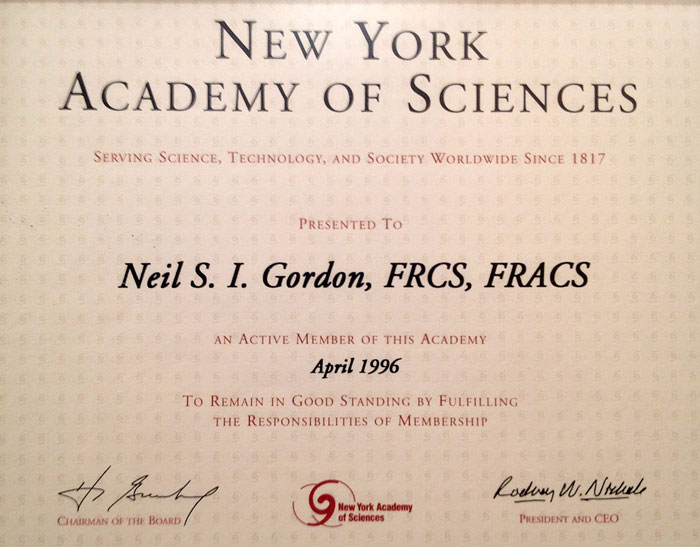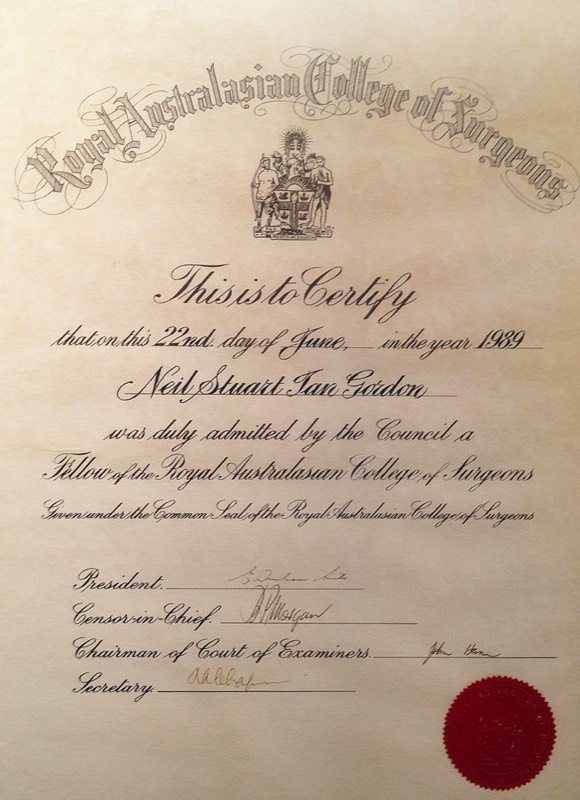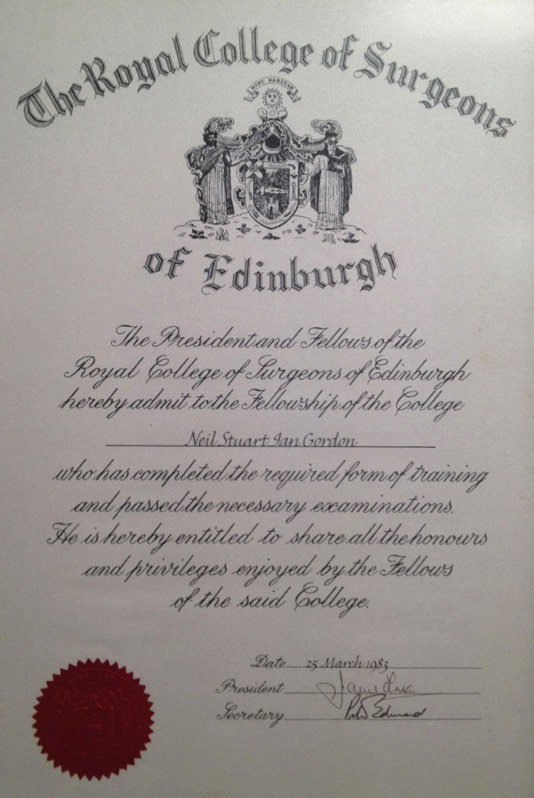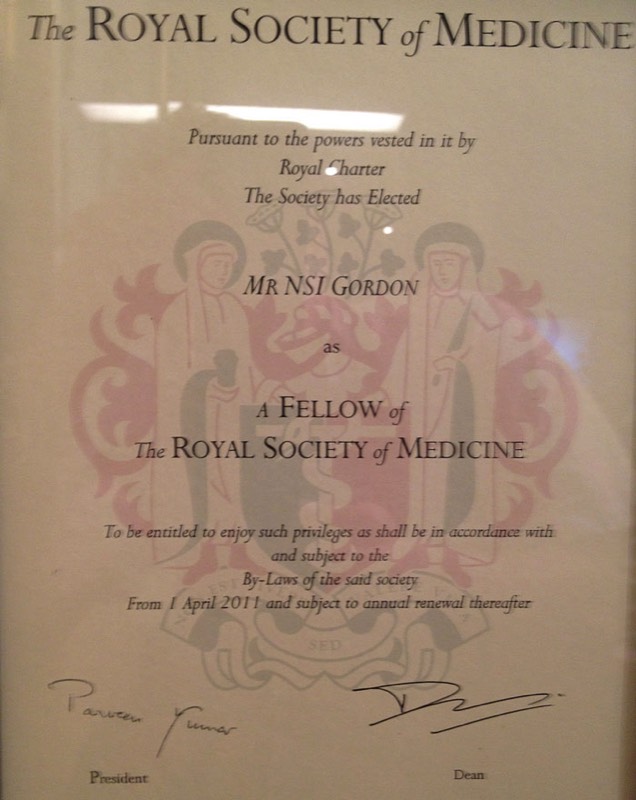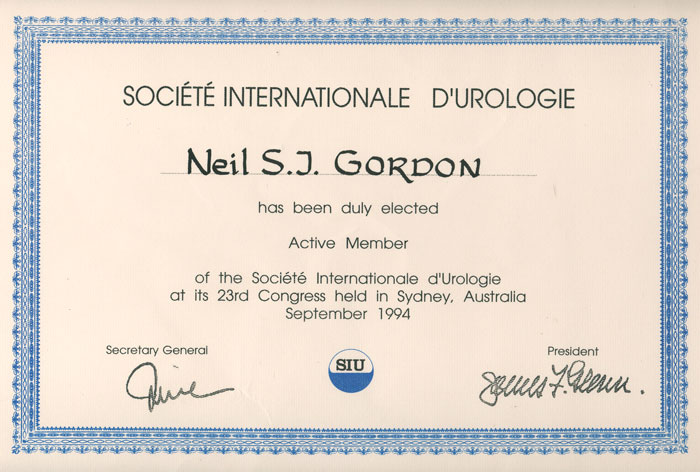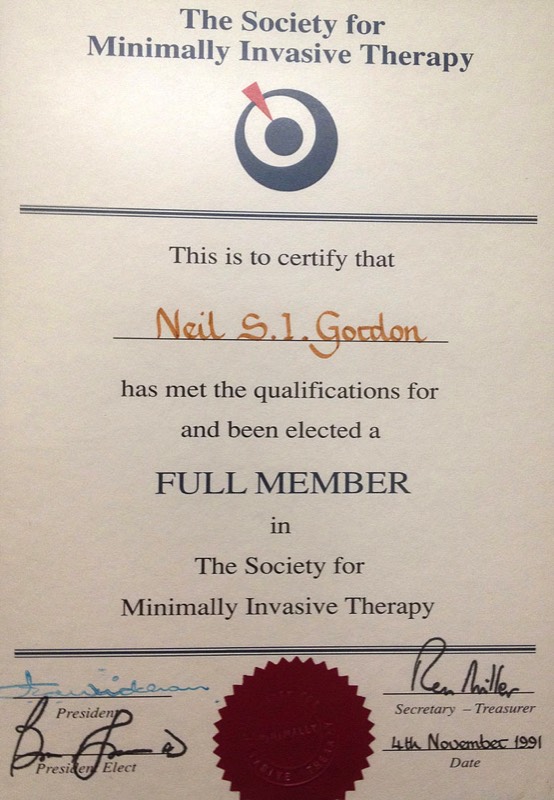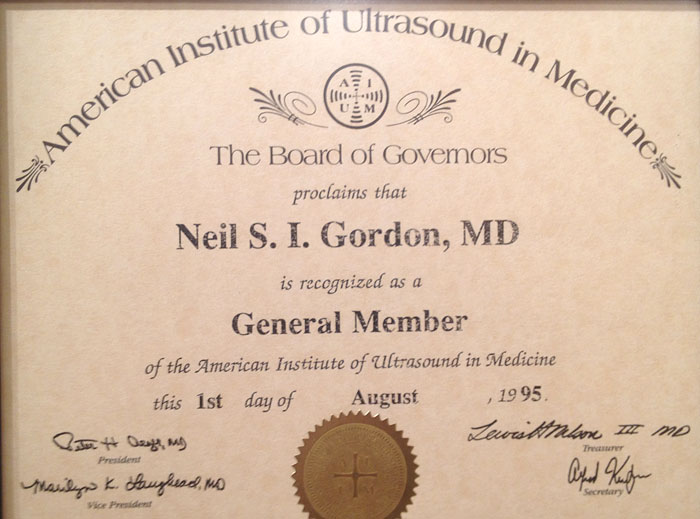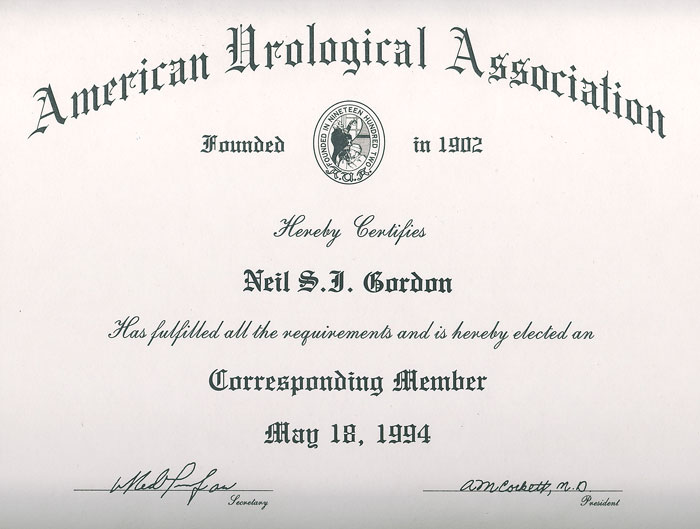Dr Neil Gordon
(MB, BS (Melb.), FRCS (Glasg.), FRCSEd., FRACS, FICS, FRSM.
Urologist
Fiat lux cognitae trans aquam; hinc sanitas.
Let there be the light of knowledge across the water; from here, health
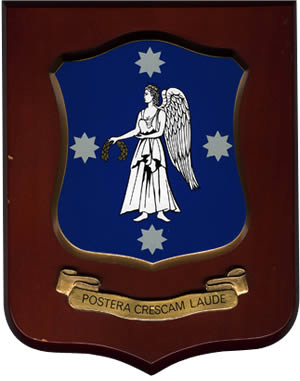
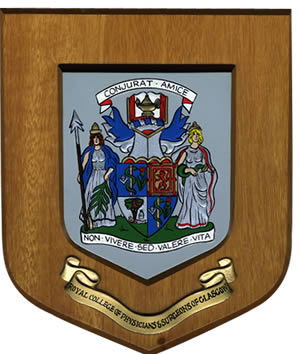
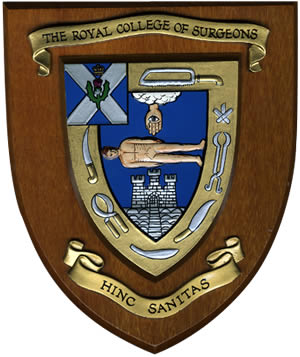
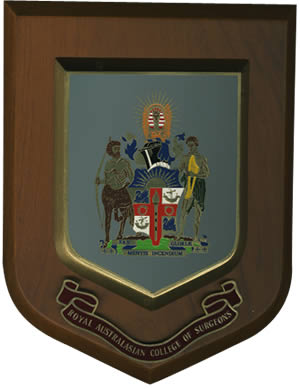
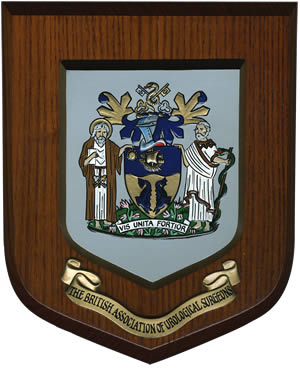
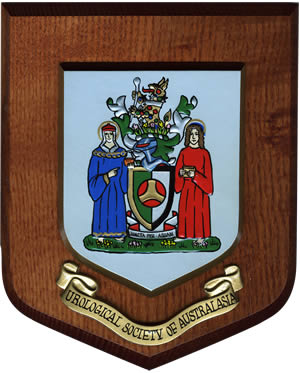
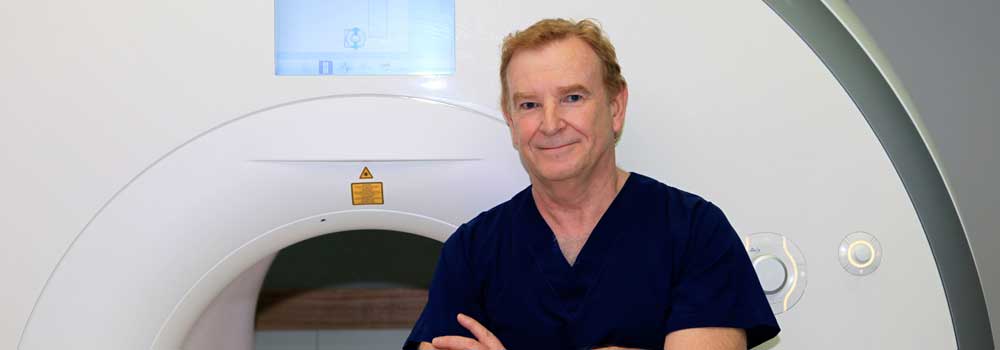
Background
Dr. Neil Gordon graduated Bachelor of Medicine and Bachelor of Surgery from the University of Melbourne. He completed his Residency years at the Austin and Repatriation Hospitals in Melbourne. Following that he travelled to Scotland where he spent the next three years working in a number of specialties including General, Orthopaedic and Cardiac Surgeries as well as Urology. During that time, he obtained the Fellowship of the Royal College of Physicians and Surgeons of Glasgow and the Royal College of Surgeons of Edinburgh.
He returned to Australia and was appointed to the position of Urology Registrar at the Queen Elizabeth Hospital in Adelaide and developed skills in kidney transplantation surgery there. He was subsequently appointed as Urology Fellow at Prince Henry’s Hospital in Melbourne where he achieved the distinction of clearing a long waiting list of surgical patients by developing a method of bed management and post-operative care to maximise efficiency. During that time he obtained Fellowship of the International College of Surgeons.
He then completed his training at the Alfred and St. Vincent’s Hospitals in Melbourne and obtained the qualification Fellow of the Royal Australasian College of Surgeons in Urology. He had a very successful practice in Bendigo, Victoria where he was the sole Urologist for 8 years after his father, Dr. Ian Gordon (also a Urologist) retired but was “head hunted” to Cairns by medical colleagues from Cairns. As he has always believed in “never say never”, he and Deanna decided to explore that prospect.
They travelled to Cairns in late 1996 to explore that avenue and felt that the opportunities for his family’s future seemed much greater in Cairns. There was a great climate, plenty of fresh air and sunshine with good schools, a university and an international airport. The city was developing into an even bigger destination for Australian and international tourism and building was doing well.
Before a decision was made, Dr. Gordon and Deanna flew to Cairns to see the effects of a cyclone but more importantly, to find out the effects on the community itself. They were overwhelmed to find that the everyone was there to help each other and were amazed at the strength of the community spirit. That sold it for them and they moved in April 1997.
Although he was aware of the lack of specialist equipment for various Urological surgical procedures, he had not considered the reluctance of both the public and private hospitals to purchase that equipment to be able to provide an up-to-date method of care for patients requiring investigation and management of Urological conditions.
The Queensland Health Minister at the time was receptive to the idea of care equivalent to patients in Brisbane but that was it as Dr. Gordon was of the view “If you want to get something done, then do it yourself”, he then set about purchasing the appropriate equipment which he was then able to install in Cairns Day Surgery allowing him to develop methods of carrying out surgery in the day-only setting combined with excellent nursing care to achieve those results.
As there is a high incidence of kidney stones in the region, the first piece of equipment purchased was an Extracorporeal Shock Wave Lithotripter (ESWL). This is a large piece of equipment which using x-rays, enables the ability to focus sound waves (shock waves) through the skin and onto a kidney stone causing it to break up into smaller fragments and be passed out naturally. There is no need to cut the patient or pass telescopes in to the body in the majority of patients. This was the first time a lithotripter was available outside a capital city in Australia.
In addition, he also purchased an Intra-corporeal lithotripter which was able to be passed alongside telescopes internally to treat kidney stones which were inappropriate for ESWL.
Ultimately, when lasers were developed for the same purpose, he purchased a laser generator also. All these procedures were always carried out in Cairns Day Surgery enabling patients to go home the same day.
Often patients require an inspection of the bladder for such conditions as blood in the urine or recurrent infections. Dr. Gordon purchased a flexible cystoscope which enabled this procedure to be carried out under local anaesthetic so the patients did not need to fast and could even drive themselves home. A true “walk in, walk out” procedure.
Prostate cancer is a very common condition affecting up to 1 in 5 men in their lifetimes. In some men it will require major treatment and early diagnosis is imperative.
In order to make the diagnosis, it is necessary to carry out a biopsy (tissue sample) is required. This is carried out using ultrasound equipment. Dr. Gordon purchased all the equipment necessary and has carried out over 1500 biopsies.
Development of the ability to only carry out biopsies which are necessary is important and in 2015 the definitive research on prostate multi parametric Magnetic Resonance Imaging (mpMRI) had been carried out between The Wesley Hospital in Brisbane and the Radboud University Medical Center in Nijmegen, Netherlands. This has revolutionized the investigation and diagnosis of prostate cancer.
In 2015 Dr. Gordon travelled with his radiology colleague to the Netherlands and successfully completed the Certificate in MRI Prostate Detection and Biopsy.
At that time Dr. Gordon was the only Urologist worldwide to have obtained that qualification and Cairns was the third location in Australia to have that scanning ability. The others were Brisbane and Sydney
Following that, Dr. Gordon was using the Soteria Remote Controlled Manipulator to carry out biopsies using MRI guidance. This is a robot which is computer guided and Dr. Gordon was the only Urologist worldwide who was trained and recognised in that procedure. He presented a paper at the 14th Urological Association of Asia Congress, Singapore, July, 2016 titled: “The Soteria Remote Controlled Manipulator (Robot) Prostate Biopsy under MRI Imaging.” A video demonstration was also presented.
When there was no availability of radiation treatment for prostate cancer in Cairns and patients had to travel to Townsville or Brisbane for eight weeks of treatment, Dr. Gordon travelled to USA and the UK where he found that Cryotherapy (freezing) of the prostate was an appropriate alternative treatment. He purchased the equipment along with a further ultrasound unit specially programmed for the purpose.
This type of treatment is very common in the UK, Europe and USA but has not been embraced by the community generally in Australia.
The procedure is carried out in day surgery and takes approximately 1hour and 30 minutes. It became a good choice for those who did not wish major surgery and did not want to leave Cairns for 8 weeks’ radiotherapy. Because of that procedure, one of the local dentists was very happy when he had the treatment on a Wednesday and was back at work on the next Monday.
He presented a paper at the 12th Australasian Prostate Cancer Conference, now known as The Prostate Cancer World Congress on “Five years of Cryotherapy for Primary Prostate Cancer” in 2011.
Currently, Cairns is the only city in Australia where prostate cryotherapy treatment is available.
With regard to prostate surgery for non-cancerous enlargement, Dr. Gordon has pioneered in that area by developing day surgery Trans-Urethral Resection of the Prostate (TURP). He has carried out over 1000 cases in day surgery rather than the routine 3-5day hospital stay. This saves a considerable financial cost to the community, has reduced the likelihood of hospital acquired infections and significantly assists the self-paying uninsured patient with regard to costs with no detriment to recovery.
He has had his work on day surgery of the prostate published in the Journal of Urology and British Journal of Urology.
Continence is very important to everyone and the development of urinary incontinence can be very disabling. The cost to the community is evident medically, socially and financially. The correct management of incontinence can be defined by carrying out an investigation called Urodynamics.
Dr. Gordon purchased a computerised urodynamic set up which enabled measurement of bladder function to help determine whether bio-feedback management, pelvic floor physiotherapy, medication or surgery or a combination of those would be the best form of management.
One form of management of incontinence brought to Cairns by Dr. Gordon is to carry out a small injection of a substance internally using a “telescope”. The injection is placed around the muscle that is used to control urine. This acts like a “washer” in a tap and stops the leakage. There are no cuts, stitches, slings or other instruments required and all procedures were carried out in the day surgery setting.
Occasionally men may stop passing urine as a result of an enlarged prostate. This is called urinary retention. It is treated initially with passage of a catheter and often will require an operation called a Trans Urethral Resection of Prostate (TURP), often referred to as a “re-bore”.
Some men are not fit for surgery for example may have had a recent heart attack and so Dr. Gordon provided an alternative to long-term catheterisation by inserting a stent called a Memokath. This enables them to pass urine and they may be able to have surgery at a later date when they recover or continue with the Memokath.
Dr. Gordon is also an experienced micro-surgeon and has used that skill in carrying out vasectomy reversals for those men who have had a change of circumstances and would like to consider returning to fertility.
He has now been in practice for 27 years in Cairns and for many years was the only Urologist north of Townsville. The practice extended north to Cooktown and Weipa and many patients came from Papua New Guinea as well as the occasional patient from a cruise ship in port and the “grey nomads” who regularly travel north in the winter.


